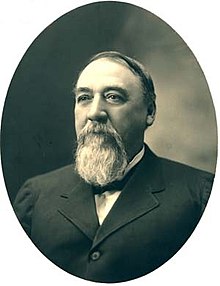James Jackson McAlester | |
|---|---|
 | |
| 2nd Lieutenant Governor of Oklahoma | |
| In office January 9, 1911 – January 11, 1915 | |
| Governor | Lee Cruce |
| Preceded by | George W. Bellamy |
| Succeeded by | Martin E. Trapp |
| Oklahoma Corporation Commissioner | |
| In office November 16, 1907 – January 9, 1911 | |
| Governor | Charles N. Haskell |
| Preceded by | Position established |
| Succeeded by | George A. Henshaw |
| United States Marshal for Indian Territory's Central District | |
| In office March 1, 1895 – April 19, 1897 | |
| Preceded by | Position established |
| Succeeded by | Jasper P. Grady |
| United States Marshal for Indian Territory | |
| In office April 6, 1893 – March 1, 1895 | |
| Preceded by | Thomas B. Needles |
| Succeeded by | Position replaced with multiple districts |
| Personal details | |
| Born | October 1, 1842 Sebastian County, Arkansas, U.S. |
| Died | September 21, 1920 (aged 77) McAlester, Oklahoma, U.S. |
| Political party | Democratic Party |
| Spouse | Rebecca Burney |
| Relatives | Benjamin Burney (brother-in-law) |
| Military service | |
| Allegiance | |
| Branch/service | Confederate States Army |
| Rank | Captain |
| Battles/wars | |
James Jackson McAlester (October 1, 1842 – September 21, 1920) was an American coal baron and politician active in Indian Territory and later Oklahoma. He served as a United States Marshal for Indian Territory from 1893 to 1897, one of three members of the first Oklahoma Corporation Commission from 1907 to 1911, and as the second lieutenant governor of Oklahoma from 1911 to 1915.
McAlester was born in Arkansas in 1842, and enlisted in the Confederate States Army during the American Civil War. After the war, he received a detailed survey of coal deposits with the Choctaw Nation in Indian Territory and traveled there to work as a trader. He later married Rebecca Burney, sister of Chickasaw Governor Benjamin Burney, which granted him citizenship in the Chickasaw Nation and Choctaw Nation. He used his tribal citizenship claim lands that contained valuable coal deposits, allowing him to become incredibly wealthy and influential in the territory.
He owned a general store in an area that eventually grew into the town of McAlester, Oklahoma, named after J. J., and he owned substantial interests in coal mining operation in the area, leading him into conflict with the Choctaw Nation's government. Chief Coleman Cole ordered McAlester's execution for violating tribal law preventing the sale of "part of the land" during his tenure, but McAlester was able to escape his sentence and resumed his activities after Cole's term. He built the McAlester House, which was listed on the National Register of Historic Places in 1980.
In the lead up to Oklahoma statehood McAlester was elected to the first Oklahoma Corporation Commission and in 1910 he was elected lieutenant governor of Oklahoma and he served until 1915. He died in 1920.